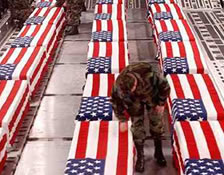Bush using Bin Laden scare tactics again
May 23, 2007
New London, Connecticut - President Bush tried to use declassified intelligence about Osama bin Laden Wednesday to defend his administration's failed Iraq war policy.

"Here in America, we are living in the eye of a storm," he claimed. "All around us, dangerous winds are swirling and these winds could reach our shores at any moment."
During a commencement address at the Coast Guard Academy, the president mentioned declassified intelligence that said bin Laden discussed sending a top lieutenant in 2005 to use Iraq as a base from which to launch attacks in the United States.
"Some question whether the fight in Iraq is part of the war on terror," Bush said before describing the plot.
"There's a reason bin Laden sent one of his most experienced paramilitary leaders to Iraq," Bush said. "He believes that if al Qaeda can drive us out they can establish Iraq as a new terrorist sanctuary."
Bush added that "the best way to protect our people is to take the fight to the enemy ... so we do not have to face them at home."
Bush also said authorities have uncovered and halted a number of planned terrorist attacks on the United States before they were carried out.
Seven months ago, a plot broken up by British authorities to blow up airplanes as they were flying toward the United States was broken up "just two or three weeks away from execution," Bush said, citing "our intelligence community" as the source of his information.
"If carried out, it could have rivaled 9/11 in death and destruction," he said.
Bush added that, in December 2001, an al Qaeda operative was captured. The U.S. intelligence community believes he had been trained at an al Qaeda camp in Afghanistan and had been sent to the United States before September 11 "to serve as a sleeper agent ready for follow-on attacks," Bush said.
The U.S. intelligence community believes that the man had met with bin Laden "and offered himself up as a martyr," Bush said.
Among the potential targets discussed were water reservoirs and U.S. military academies, Bush said.
The president cited two other post-9/11 aviation plots, one allegedly devised by 9/11 mastermind Khalid Sheikh Mohammed "to repeat 9/11 destruction by sending operatives to hijack an airplane and fly into the tallest building on the West Coast."
Bush said Mohammed has said the target was the Library Tower in Los Angeles.
Finally, another East Coast aviation attack plot was uncovered and halted in 2003, Bush said. It would have included "multiple airplanes that had been hijacked and crashed into targets in the United States," he said.
Bush credited "bold action at home and abroad" with foiling the plans.
The address coincided with an ongoing push by the Democratic majority in Congress to force an end to U.S. involvement in Iraq.
On Tuesday, White House spokesman Gordon Johndroe said bin Laden and a top lieutenant -- Abu Faraj al-Libbi -- planned to form a terror cell in Iraq in order to launch those attacks, Johndroe said.
Al-Libbi was a "senior al Qaeda manager" who in 2005 suggested to bin Laden that bin Laden send Egyptian-born Hamza Rabia to Iraq to help plan attacks on American soil, Johndroe said.
Johndroe noted that bin Laden later suggested to Abu Musab al-Zarqawi, then leader of al Qaeda in Iraq, that America should be his top priority. That was followed in the spring of 2005 with bin Laden's ordering Rabia to brief al-Zarqawi on plans to attack the United States, Johndroe said.
Johndroe added the intelligence indicates al-Libbi later suggested Rabia should be sent to Iraq to carry out those operations.
But al-Libbi was captured in Pakistan and taken into CIA custody in May 2005. After al-Libbi's capture, the CIA's former acting director, John McLaughlin, described him as bin Laden's chief operating officer, the No. 3 man in al Qaeda.
"Catching terrorists is sometimes like trying to solve a jigsaw puzzle without seeing the picture on the box," McLaughlin said at the time. "This is a guy who knows the picture on the box. He knows what the big picture is."
Al-Libbi is a Libyan who joined al Qaeda in the 1990s and fled to Pakistan after the United States invaded Afghanistan in late 2001. U.S. officials say al-Libbi was in contact with and directing alleged al Qaeda members in the United Kingdom who were planning attacks there and in the United States. He was also believed to be behind two 2005 attempts to assassinate Pakistan's President Pervez Musharraf.
Rabia took over al-Libbi's position in the organization but was killed in in the North Waziristan tribal area of Pakistan near the Afghan border in December 2005.
Jordanian-born al-Zarqawi was killed by a U.S. airstrike north of Baghdad in June 2006.
© AlaskaReport News
|

